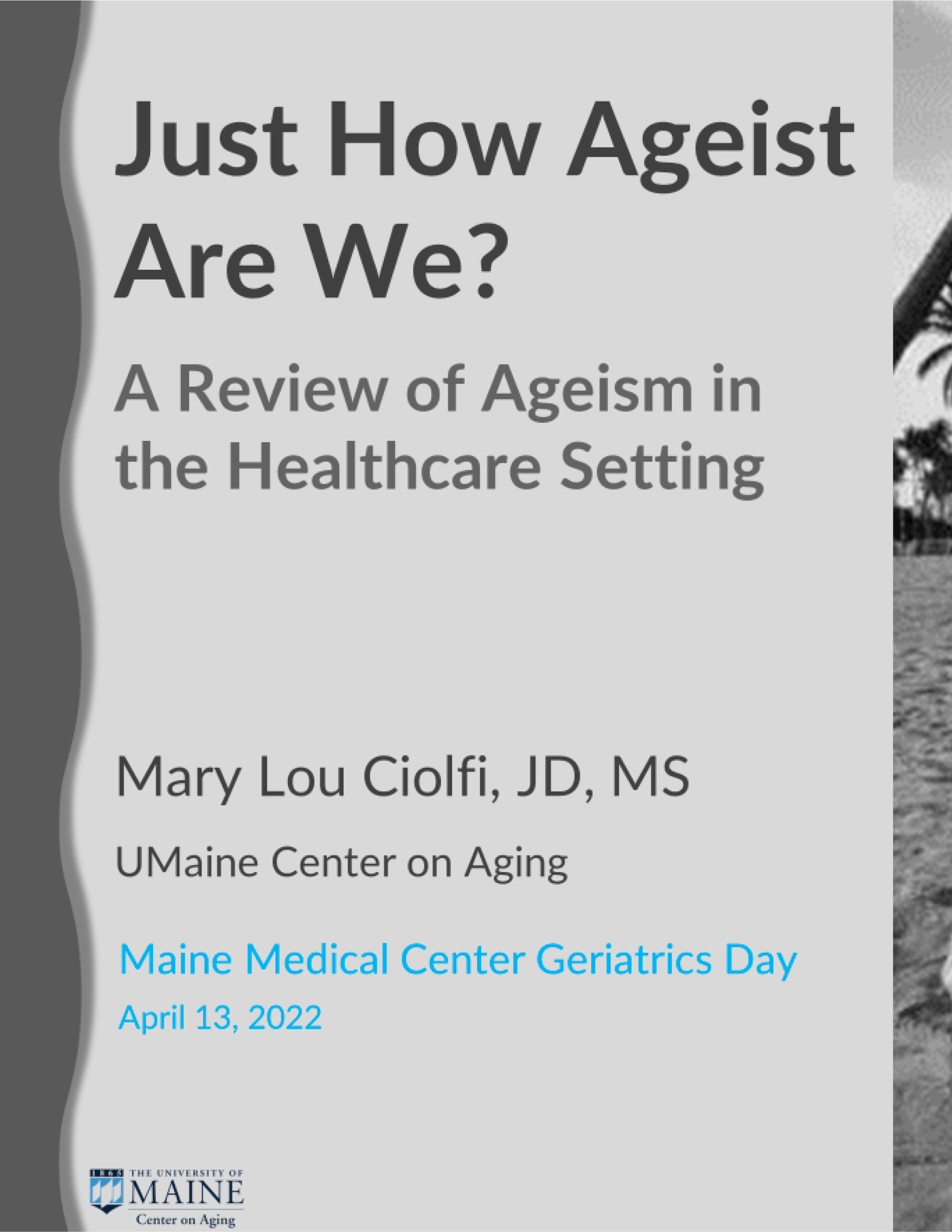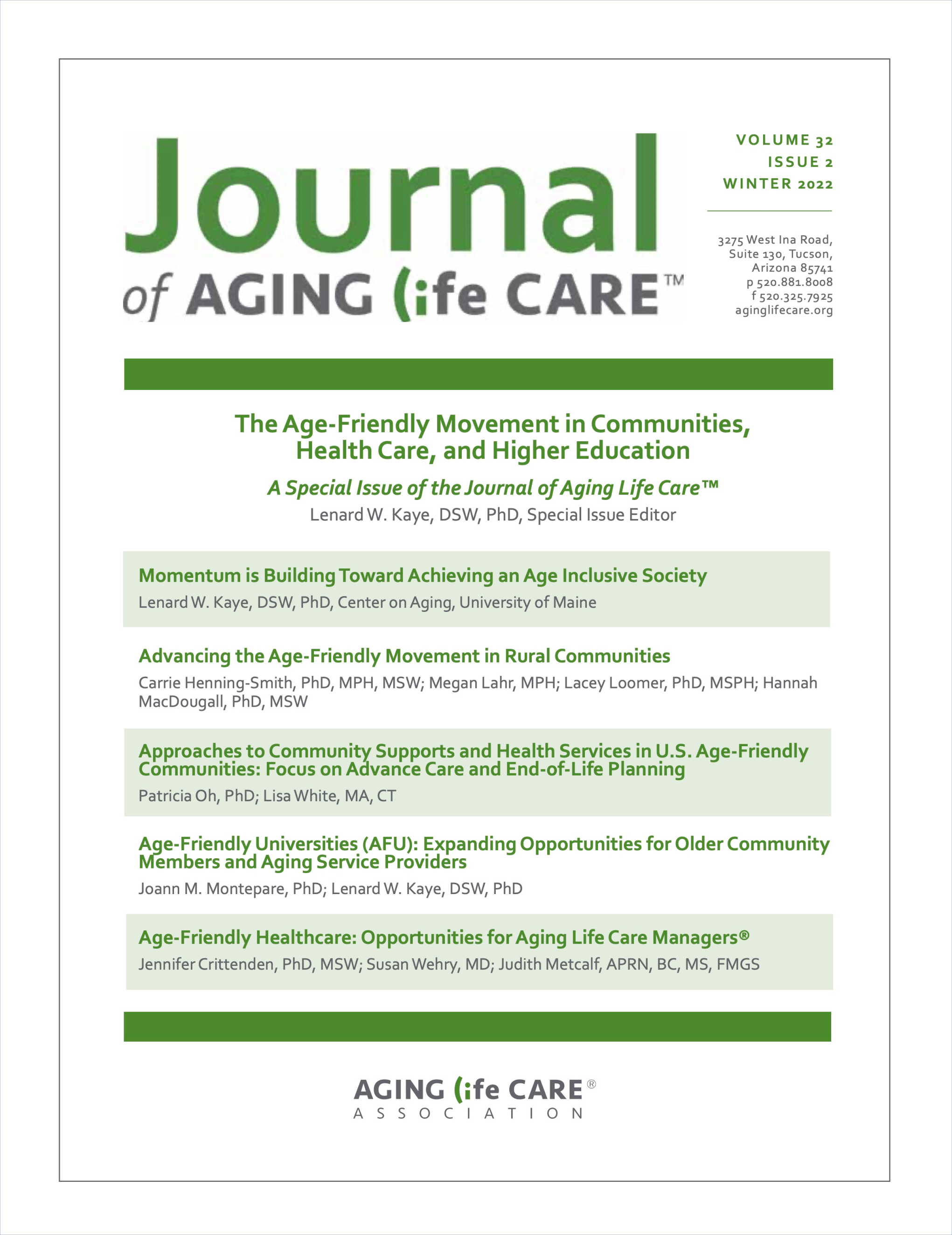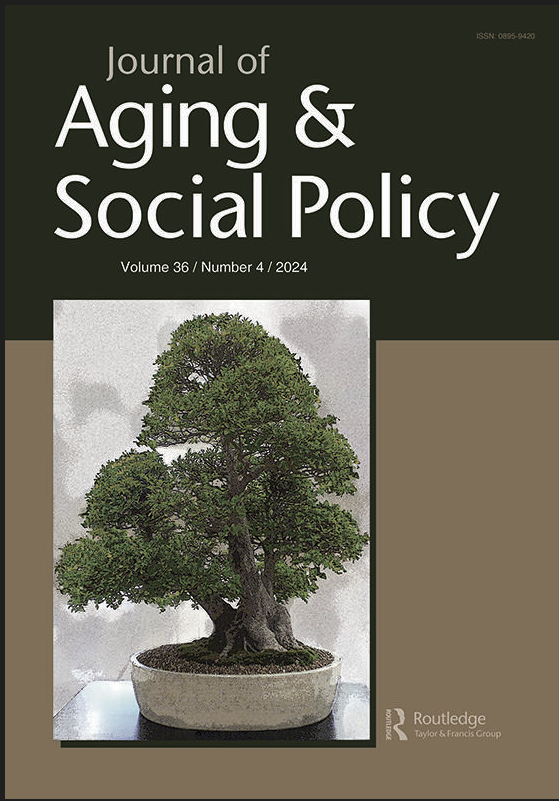
Extended List -
Selected Publications
Multistate Needs Assessment to inform ECHO Curricula for Behavioral Health, Substance Use, and Social Connection Needs for Adults and Older Adults
Report presenting finds from a needs assessment of behavioral health clinicians and social service providers across Maine, New Hampshire, Vermont, and New York’s northern counties on gaps in content knowledge and services to meet the needs of adult and older adult clients and patients with behavioral health, substance use, and social connection concerns.
MCOA’s Leadership Exchange on Ageism Evaluation Report for Cohorts 1, 2, and 3
Report presenting the findings of evaluation-focused data collection from alumni of the first three cohorts of Maine Council on Aging’s innovative Leadership Exchange on Ageism.
Just How Ageist Are We? A Review of the Ageism in the Healthcare Setting
A presentation on ageism to Maine clinicians and health service providers for Maine Medical Center’s Geriatrics Day.
Long-Term Care Resident Perspectives on Person-Centered Care: Intersections of Practice and Theory
A peer-reviewed journal article presenting findings from information gathered from residents of long-term care communities on their understanding and experience of person-centered care.
Post-up demand for care among dual-eligible victims of elder financial exploitation in Maine
Research article examining the health care and long-term services and supports costs associated with older victims of financial exploitation who are eligible for both Medicare and Medicaid.
Respite for ME Grants First Year Evaluation Report
Program evaluation report on the first year experience of the Respite for ME family caregiver grant pilot program in Maine.
Economic Security of Older Women in Maine
Report detailing the disparities in economic security of older women in Maine compared to men and the implications of these disparities in older women’s ability to meet their needs in later life.
Maine State Plan on Aging Needs Assessment
Final report of a statewide needs assessment to determine the needs and priorities of older adults and caregivers to inform Maine’s 2025-2028 State Plan on Aging which strategizes the most effective ways to support older adults in aging communities, particularly for those services and supports funded through the Older Americans Act (OAA).
New York Integrated Appeals and Grievances Demonstration: Third Brief Report
Third and final report of the evaluation of the New York Integrated Appeals and Grievances demonstration which aligned Medicare and Medicaid appeals and grievances processes for dually eligible beneficiaries enrolled in D-SNPs in New York.
Municipal Approaches to Disaster Preparedness and Resilience: A survey of Maine’s Age-Friendly Communities
A survey of Maine's Age-Friendly Communities revealed widespread concern about disasters, yet only 15% of local disaster/resilience plans explicitly address older adults' needs. While gaps were identified in communication, transportation, and infrastructure persist, especially in smaller communities, AFCIs are actively addressing preparedness through grassroots efforts and partnerships. The report concludes with recommendations to bolster AFCI engagement in local disaster/resilience efforts.
Moving Forward Together: A suvey of age-friendly transportation initiatives
This report investigated how age-friendly community initiatives (AFCIs) have improved local transportation for older residents. It found that most AFCIs implemented programs to enhance accessibility (96%), affordability (76%), and engaged in partnerships (80%). The study highlights rural-urban differences in approaches and offers recommendations to support AFCIs, including developing assessment tools and promoting knowledge exchange.
Approaches to Community Supports and Health Services in US Age-Friendly Communities: Focus on Advance Care and End-of-Life Planning
A peer-reviewed journal article presenting data from publicly available age-friendly community progress reports to describe the nature and extent of age-friendly implementation in community support and health services domain and specifically, in end of life planning.
Assessing Age-Friendly Communities: What have we learned?
This study analyzes progress reports from 30 American age-friendly communities (AFCs) in the WHO's Global Network. The authors found strong evidence of leadership, resources, and collaborations, with most AFCs reporting health equity initiatives. However, older adult engagement was moderate, and evaluation practices were weak. While acknowledging AFC accomplishments, the authors recommend improved evaluation, dissemination, and clearer articulation of older adults' roles and data-driven prioritization across all stages of AFC development.
Leveraging Higher Education in Our Age-Friendly World This study examines how U.S. higher education institutions engage with Age-Friendly Communities (AFC). Analyzing reports from 80 AFCs, researchers found widespread partnerships with colleges and universities, primarily in research, teaching, and service activities. These efforts aligned with AFC model phases and domains, concentrating on social aspects and action implementation. The authors conclude with recommendations to identify opportunities for greater collaboration between higher education and AFCs.
Let’s talk
Fill out the form and include a brief description of your work and your needs, and we’ll be in touch soon.


















